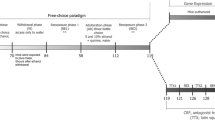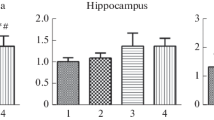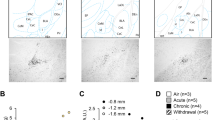Abstract
The role of the neuropeptide corticotropin-releasing factor (CRF) in mediating the behavioral effects of ethanol withdrawal in the rat was examined using the elevated plus-maze test. In Experiment 1, CRF (0.5 µg ICV) reduced the percentage of time spent on the open arms of the elevated plus-maze, consistent with an “anxiogenic-like” effect. CRF also reduced the total number of arm entries, indicating a reduction in general activity. Low doses (5 and 25 µg ICV) of the CRF antagonist, alpha-helical CRF produced no behavioral effects in the elevated plus-maze, while a higher dose (50 µg ICV) elicited CRF-like activity. In experiment 2, rats were maintained for 2–3 weeks on a liquid diet containing ethanol (8.5–11.5% v/v) or sucrose. Eight hours after withdrawal from the ethanol diet rats displayed “anxiogenic-like” responses as well as a reduction in general activity in the elevated plus-maze compared with rats withdrawn from control diet. Alpha-helical CRF significantly antagonized the “anxiogenic-like” effects of ethanol withdrawal in the plus-maze. General activity and physical signs of ethanol withdrawal such as tail stiffness, body tremor and ventromedial distal flexion were unaffected by alpha-helical CRF. Blood Alcohol Levels (BALs) determined immediately after removal of the ethanol diet showed no group differences in ethanol consumption. These results suggest that increased activity of central CRF systems may mediate the anxiogenic effects of ethanol withdrawal.
Similar content being viewed by others
References
Britton KT, Koob GF (1986) Alcohol reverses the proconflict effect of corticotropin-releasing factor. Regul Pept 16:315–320
Britton KT, Lee G, Dana R, Risch SC, Koob GF (1986a) Activating and “anxiogenic” effects of CRF are not inhibited by blockade of the pituitary adrenal system with dexamethasone. Life Sci 39:1281–1286
Britton KT, Lee G, Vale W, Rivier J, Koob GF (1986b) Corticotropin releasing factor antagonists block activating and “anxiogenic” actions of CRF in the rat. Brain Res 369:303–306
Cappel H, Herman CP (1977) Alcohol and tension reduction. Q J Stud Alcohol 1:21–29
Dunn AJ, File SE (1987) Corticotropin-releasing factor has a anxiogenic action in the social interaction test. Horm Behav 21:193–202
Eaves M, Britton KT, Rivier J, Vale W, Koob GF (1985) Effects of corticotropin releasing factor on locomotor activity in hypophysectomized rats. Peptides 6:923–926
Ehlers CL, Chaplin RI (1987) Chronic ethanol exposure potentiates the locomotor activating effects of corticotropin-releasing factor (CRF) in rats. Regul Pept 19:345–354
File SE, Johnston AL, Baldwin HA (1988) Anxiolytic and anxiogenic drugs: changes in behavior and endocrine responses. Stress Medicine 4:221–230
File SE, Baldwin HA, Hitchcott PK (1989) Flumazenil but not nitrendipine reverses the increased anxiety during ethanol withdrawal in the rat. Psychopharmacology 98:252–264
Goldstein DB, Pal N (1971) Alcohol dependence produced in mice by inhalation: grading the withdrawal reaction. Science 172:288–290
Koob GF, Braestrup C, Thatcher-Britton K (1986) The effects of FG 7142 and RO 15-1788 on the release of punished responding produced by chlordiazepoxide and ethanol. Psychopharmacology 90:173–178
Pellow S, File SE (1986) Anxiolytic and anxiogenic drug effects on exploratory activity in an elevated plus-maze: a novel test of anxiety in the rat. Pharmacol Biochem Behav 24:525–529
Pellow S, Chopin P, File SE, Briley M (1985) Validation of open: closed arm entries in an elevated plus-maze as a measure of anxiety in the rat. J Neurosci Methods 14:149–167
Rivier C, Bruhn T, Vale W (1984a) Effect of ethanol on the hypothalamic-pituitary-adrenal axis in the rat: role of corticotropin-releasing factor (CRF). J Pharmacol Exp Ther 229:127–131
Rivier C, Rivier J, Vale W (1982) Inhibition of adrenocorticotropic hormone secretion in the rat by immunoneutralization of corticotropin-releasing factor. Science 218:388–378
Rivier J, Rivier C, Vale W (1984b) Synthetic competetive antagonists of corticotropin-releasing factor: effect on ACTH secretion in the rat. Science 224:889–891
Vale W, Spiess J, Rivier C, Rivier J (1981) Characterization of a 41 residue ovine hypothalamic peptide that stimulates the secretion of corticotropin and beta-endorphin. Science 213:1394–1397
Van Thiel D (1983) Adrenal response to ethanol: a stress response. In: Pohorecky LA, Brick J (eds) Stress and alcohol use. Elsevier, Amsterdam, pp 23–27
Williams AF (1966) Social drinking, anxiety and depression. J Pers Soc Psychol 3:689–693
Author information
Authors and Affiliations
Rights and permissions
About this article
Cite this article
Baldwin, H.A., Rassnick, S., Rivier, J. et al. CRF antagonist reverses the “anxiogenic” response to ethanol withdrawal in the rat. Psychopharmacology 103, 227–232 (1991). https://doi.org/10.1007/BF02244208
Received:
Revised:
Issue Date:
DOI: https://doi.org/10.1007/BF02244208




